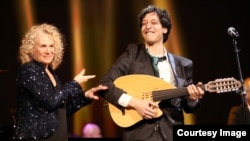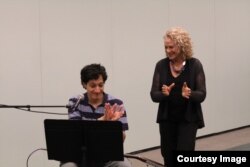When four-time Grammy winner Carole King took the stage Jan. 24 in Los Angeles at the MusiCares Person of the Year ceremony in her honor, she was accompanied by Berklee College of Music student Ahmad El Haggar.
They presented a new arrangement of Home Again, influenced by Middle Eastern melodies.
El Haggar, 25, a vocalist and oud player from Egypt, began studying at Berklee College of Music in Boston last year, the same year King received an honorary doctorate from the school for her lifetime achievement in music.
“In the course of getting that award, I was assigned a student escort for the two days I was there,” King said.
That student was El Haggar.
“We had been talking about his study of Western music and he explained to me a lot of things about Arabic music, which is so amazing," King said. "Things like we have something like 12 modes, they have 200. I just found it so fascinating.”
King got excited about the idea of a multicultural collaboration with the young Egyptian musician and even allowed him to choose which song they'd perform together.
“Home Again is from King’s most famous album called Tapestry," El Haggar said. "The song touched me in the sense of the words and the music. It does speak about a person that wishes they can just return home, and for me I related to that. I left Egypt a year ago." In the new arrangement, El Haggar introduced Eastern rhythm instruments like the “tabla” and “douf.”
“I think it’s a very eye-opening and mind-opening idea to reach out and include musicians and musical stars from different cultures,” said Christiane Karam, who teaches several groups, including the Middle Eastern Fusion Ensemble and Eastern Vocal Styles Ensemble, at Berklee.
She says multicultural music can be incredibly rich and powerful when done well, which is not always easy.
“I look very much at it as a form of translation," she said. "You need to understand the people, you need to learn the language, you need to go to this country, eat the food, go to people’s houses, understand traditions,dance with the people. You can only really understand the music, if you immerse yourself in those aspects.”
Karam credits El Haggar’s study of Western music for his successful collaboration with King
The rising Egyptian artist says he is overwhelmed with the feedback he got from the audience that included some of America’s singing superstars, who gave him a standing ovation.
They presented a new arrangement of Home Again, influenced by Middle Eastern melodies.
El Haggar, 25, a vocalist and oud player from Egypt, began studying at Berklee College of Music in Boston last year, the same year King received an honorary doctorate from the school for her lifetime achievement in music.
“In the course of getting that award, I was assigned a student escort for the two days I was there,” King said.
That student was El Haggar.
“We had been talking about his study of Western music and he explained to me a lot of things about Arabic music, which is so amazing," King said. "Things like we have something like 12 modes, they have 200. I just found it so fascinating.”
King got excited about the idea of a multicultural collaboration with the young Egyptian musician and even allowed him to choose which song they'd perform together.
“Home Again is from King’s most famous album called Tapestry," El Haggar said. "The song touched me in the sense of the words and the music. It does speak about a person that wishes they can just return home, and for me I related to that. I left Egypt a year ago." In the new arrangement, El Haggar introduced Eastern rhythm instruments like the “tabla” and “douf.”
“I think it’s a very eye-opening and mind-opening idea to reach out and include musicians and musical stars from different cultures,” said Christiane Karam, who teaches several groups, including the Middle Eastern Fusion Ensemble and Eastern Vocal Styles Ensemble, at Berklee.
She says multicultural music can be incredibly rich and powerful when done well, which is not always easy.
“I look very much at it as a form of translation," she said. "You need to understand the people, you need to learn the language, you need to go to this country, eat the food, go to people’s houses, understand traditions,dance with the people. You can only really understand the music, if you immerse yourself in those aspects.”
Karam credits El Haggar’s study of Western music for his successful collaboration with King
The rising Egyptian artist says he is overwhelmed with the feedback he got from the audience that included some of America’s singing superstars, who gave him a standing ovation.
The Musicare Person of the Year ceremony is one of the high-profile events held during Grammy Week. Multi-Grammy winners Jakob Dylan, Amy Grant, Alicia Keys, Jennifer Nettles, Pink, Gloria Estefan and Lady Gaga also performed at the event.
El Haggar hopes other crossover artists from the Arab World will have similar opportunities. He believes there'a nothing like music to connect cultures around the world and bring people together.







